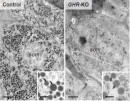New insights into effects of GHR deficiency on the pituitary gland
15.04.2023
New insights into effects of GHR deficiency on the pituitary gland
Pigs with target knock-out of the growth hormone receptor (GHR-KO pigs) show a significant retardation in growth. This phenotype has implications on xenotransplantation as it reduces the size of xenograft donor pigs and is studied for translational research on growth hormone (GH) and insulin-like growth factor 1 (IGF1) action and function. As GHR-KO pigs show reduced IGF1 levels in circulation, the feedback regulation of pituitary GH secretion is disturbed, resulting in constantly increased GH levels. Aim of the study was to investigate the associated quantitative histomorphological and molecular alterations on the pituitary gland and the adenohypophysis in particular. We were able to show, that the constantly elevated GH levels in serum are not associated with an increase of the GH-producing somatotroph cell compartment in the adenohypophysis but result from a constant production and release of GH. This was indicated by label-free proteomics in adenohypophyseal samples showing a decreased abundance of the somatotropin precursor accompanied by increased abundances of proteins involved in protein production, transport and endoplasmic reticulum (ER) stress. The lower GH content in somatotroph cells was verified by electron microscopy, revealing a reduced content of GH-storing granules in somatotrophs of GHR-KO pigs.
doi: 10.1111/jne.13277. Epub ahead of print. PMID: 37160285.


